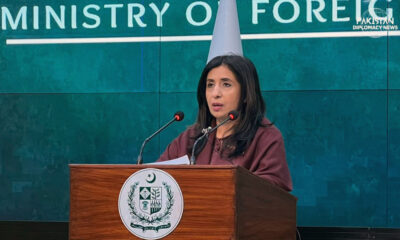Pakistan
Pakistan strongly criticized recent remarks made by a senior United States official who suggested that Islamabad might use its nuclear missile capabilities for hostile purposes.
The Pakistani government labeled the comments as “perplexing” and “illogical,” emphasizing that the country’s strategic defense program is solely designed for deterrence, not aggression.
In an official statement, Pakistan’s Foreign Office clarified that its nuclear program and associated capabilities are meant to counteract visible existential threats from neighboring countries.
The statement asserted that these capabilities should not be perceived as a threat to any nation beyond Pakistan’s immediate neighborhood.
The controversy arose after Deputy National Security Adviser Jon Finer, during a speech at the Carnegie Endowment for International Peace, expressed concern over Pakistan’s development of long-range ballistic missiles.
He suggested that such capabilities could potentially allow Islamabad to target regions beyond South Asia, including the United States. Finer further raised “real questions” about Pakistan’s intentions, describing the country’s actions as “an emerging threat to the United States.”
Finer’s comments came just one day after the U.S. announced sanctions on Pakistan’s missile development efforts. The U.S. State Department imposed measures on the National Development Complex, a state-owned defense agency, and three private firms involved in Pakistan’s missile program.
These sanctions were imposed under an executive order targeting proliferators of weapons of mass destruction and their delivery systems.
In response, Pakistan’s Foreign Office rejected these allegations, describing them as unfounded and lacking rationality. The statement pointed out that Pakistan and the United States have enjoyed a cooperative relationship since 1954 and that such accusations were unhelpful, especially in the absence of credible evidence.
The Foreign Office reaffirmed Pakistan’s commitment to peace, stating that its nuclear capabilities are intended solely for the defense of the nation’s sovereignty and regional stability.
Pakistan further stressed that it cannot forgo its right to maintain a credible deterrence in the face of evolving security challenges. Since 2012, Pakistan has made repeated efforts to address U.S. concerns about its missile program, but these efforts have often been met with skepticism.
The Foreign Office emphasized that any attempts to interfere with Pakistan’s strategic program would be unacceptable and are not open to negotiation.
Pakistan also took issue with being placed in the same category as countries perceived to have adversarial relations with the U.S.
It pointed out that concerns about its missile capabilities are being raised disproportionately, while ignoring the more advanced missile programs of its eastern neighbor, India.
Finally, the Foreign Office reiterated Pakistan’s long-standing desire for constructive engagement with the U.S. on issues of security and regional stability, underscoring the importance of a balanced approach. Pakistan remains committed to maintaining peace and stability in South Asia while safeguarding its national defense.


